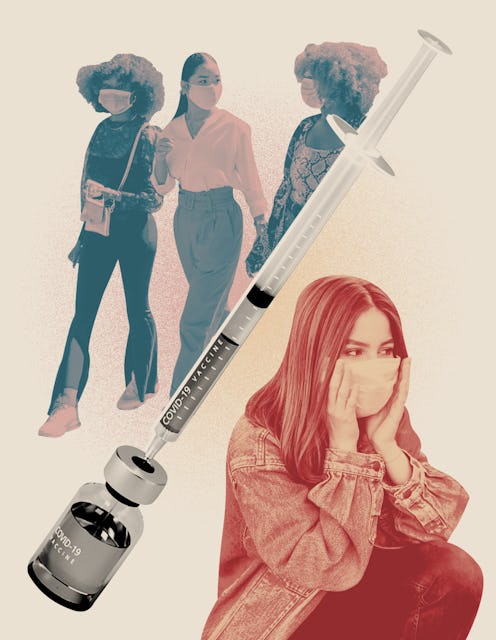Relationships
Everyone’s Invited. Except For The Unvaccinated.
Disagreements about the COVID vaccine are forcing friendships to unravel.

Prior to the pandemic, childhood best friends Alex and Kayla have made cross-country trips to see each other at least once a year for the past decade. So as soon as the COVID vaccine started rolling out, Alex, 38, texted Kayla, 37: “Girls’ trip in 2022 for sure!”
“I knew it was going to be a long time until I could get vaccinated,” Alex, a writer based in Los Angeles, tells Bustle, “but it was cool to imagine getting to spend time together again.”
Kayla, an essential worker in Louisiana who had just gotten vaccinated, saw things a little differently. “She wanted to come see me right away,” Alex says. “She was ready to book flights and everything.” Alex pumped the brakes. She had heard that even vaccinated people could still transmit the virus — something researchers are working to disprove — and living in a high-risk city meant she didn’t want to take any chances. “Even if it is safe, the optics of these things look really bad.” During an uncomfortable phone call, Alex insisted that Kayla hold off on booking tickets until the COVID cases dropped.
More people are getting vaccinated every day, which means the possibility of getting to spend time with loved ones is closer than ever. But with a third of Americans hesitant about getting vaccinated, differing opinions on what is appropriate behavior post-vaccine, and disparate timelines for when people can get it, the vaccine is causing social groups to unravel, new friendships to form, and people to have yet another awkward pandemic safety conversation.
“The pandemic has forced us to talk with our friends in new ways,” says Lydia Denworth, a science journalist and the author of Friendship: The Evolution, Biology, and Extraordinary Power of Life's Fundamental Bond. She sees conversations around exposure, risk, and comfort levels as similar to negotiating consent in a sexual relationship; in both cases, you need to make sure everyone’s boundaries are clear and agreed upon in advance. Vaccination — when (or if) your friends are getting it; how comfortable they are resuming “normal” life after — is the latest issue to hash out.
"These people have never had an issue until now, so the decision to part ways is purely on them."
Ashley, 33, initially thought she’d be vaccinated in time for her sister’s wedding this summer. But now, knowing she’s in one of the last phases, Ashley is worried she’ll have to decide between disappointing her sister or risking her health. “The rollout of the vaccine is not going as planned, yet my sister seems adamant about going forward as if there isn’t a pandemic,” Ashley says. When Ashley shared that she and her other sisters were feeling “skeptical” about traveling for the bachelorette party, her sister got upset. “It’s causing tension.”
In some cases, differing opinions on the vaccine have left people wondering if they’ll ever hug certain friends or family again. Cheryl, a 35-year-old first-time mom who was six months pregnant when the pandemic started, has set strict guidelines for who can see her newborn. As Christian Scientists, her parents and siblings don’t believe in vaccinations, for COVID or otherwise. Cheryl has decided that only people who are vaccinated and heeding COVID precautions can meet her child, a decision that she says has caused constant fighting since her child was born. “They will not see the baby until the numbers are down or he is vaccinated,” Cheryl says.
On the other side of the fence, Lylajean, 40, is a mother of three children (ages 2, 18, and 22) who doesn’t believe in vaccination. Since December, she says she’s been asked to provide proof of a COVID shot in order to make future plans with loved ones. She’s lost several friends over her decision to not get vaccinated against COVID, even though no one had previously questioned her stance on other common vaccinations. “I am now judged and segregated immediately. No questions asked,” Lylajean tells Bustle. “These people have never had an issue until now, so the decision to part ways is purely on them. My circle has become much smaller this last year.”
While the COVID vaccine is the only way we’ll be able to safely see our friends again, it also reintroduces something many people have been able to avoid for the past year: FOMO. For Alex, who had to push back her girls trip, she felt like not only was she missing out on social interaction, but she was also hurting a friend. “I would love to see her. It’s just hard to know when things are going to be normal again,” she says.
“This is going to be a time to navigate,” says Denworth, who pointed out that exclusion — or just the possibility thereof — is incredibly painful for people. “It's made more so by how much we long to see each other people right now.” For people in different phases of the vaccine rollout, that pain is temporary and will pass once we achieve herd immunity and can socialize normally. But for those whose friends or families who disagree on getting vaccinated, or who have lost friends over COVID-related conflicts, that pain can continue on long after this pandemic is over.
This article was originally published on